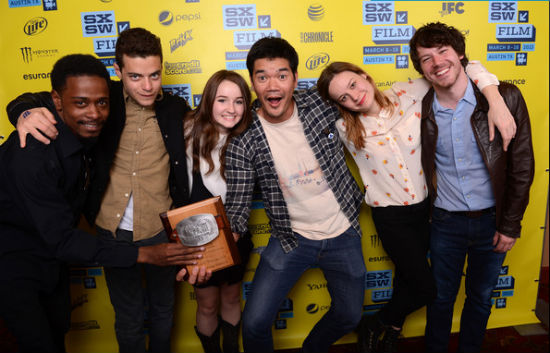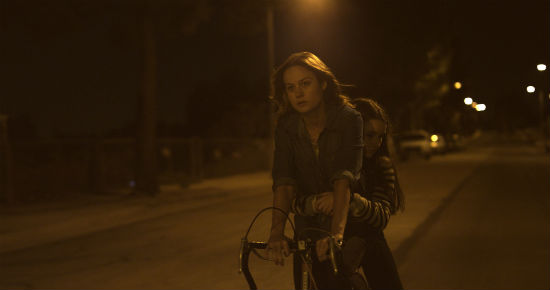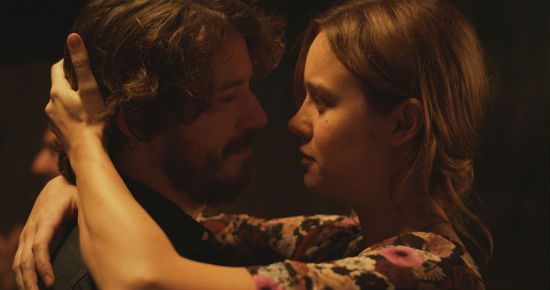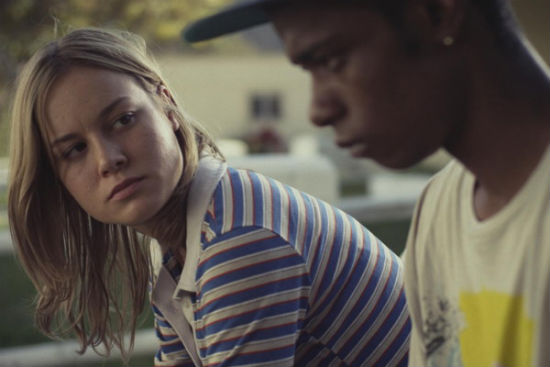/Film Interview: 'Short Term 12' Director Destin Daniel Cretton
Maybe you saw the trailer for Short Term 12, where someone called it "a shining example of what cinema is all about." That was me, and I was not overstating the film's quality. Destin Daniel Cretton's film about young people watching over troubled kids is simply that good. Maybe even better.
Brie Larson (Scott Pilgrim vs. the World) and John Gallagher Jr. (The Newsroom) star as two young adults who put their own personal problems aside every morning when they go to a halfway house for despondent young kids called Short Term 12. Cretton not only creates rich, realistic characters in every single role, but they make you laugh one instant and cry the next, with the emotions never feeling forced or out of place. It's about as great a movie as I can remember seeing in a long time.
Which meant I jumped at the chance to sit down and chat with the writer and director of the film. We talked about the pressures of the film's praise, balancing tones, when he knew the film would all come together, his methods of filmmaking, a deleted scene that really moved him and the difficulties of being a writer/director.
Short Term 12 opens on a limited basis on August 23 and expands from there. Read our interview and seek it out. You will not be disappointed./Film: So I've been playing this game since I saw your movie. It's called "Does Anybody Not Like Short Term 12?" I have not found one person. Have you found one person?
Destin Daniel Cretton: [Laughs] Yeah. I think there was this one film critic who tweeted once "Short Term 12 sucks."
That's it?
Yeah, but I didn't meet him. I was actually really curious to talk to him about it.
The closest I got was yesterday when a couple more people saw the movie and one said "I really liked it until the last ten minutes." I'm like "What? The last ten minutes are amazing." So that was the closest I've been.
I wonder if it was...
The stuff in the house.
I could see that.
Does the good reception put added pressure on you?
I don't know. Yeah, I mean it's wonderful. I mean I feel like it's wonderful, because I think the praise is... I mean for me, not only myself but all of the heads, like my DP, my composer, we all wanted to create something that wasn't flaunting our own department or our own artistic sides. There's nobody coming and praising like "Those shots are so amazing" It feels like when people connect with this movie, they are connecting for the reason of like everybody's combined passion for it, which is cool and for me personally this journey has been, because of the conversations that I've been able to have, it feels like the movie creates an environment that makes people want to have somewhat personal conversations afterwards. That's been really touching and moving for me.
 When did you know that all of these pieces came together?
When did you know that all of these pieces came together?
It was a test screening at San Diego State University. It was for an intro class for about a hundred freshmen students and it was a giant mixture of tattooed up guys that I know aren't interested in much more than drinking and going to whatever party they have that night. I mean, it was just a mixture of kids. When we started the movie I was extremely worried, because all I saw... I was sitting in the back and all I saw were iPhones just lit up everywhere and the movie was going. I was like "Oh shit. This is not going to be a good test screening on that call." But then slowly the iPhones went off and it was still one of the most engaged audiences that I've witnessed. They were laughing off their rockers, getting quiet at the perfect moments and just responding to everything in the movie.
It was still an early cut of the movie, but already no sound mix or anything, at the end of that screening I had guys coming up to me who I know had never seen an indie movie before and didn't give a shit about the subject matter, but coming up to me with still tears in their eyes and having real conversations about stuff. That's when I was like "Thank goodness that something about this is really connecting to people."
One of the things I loved about the movie is the way that you can effortlessly go between tones. Like you said "laughing one minute, silent the next, crying the next. Scared." How do you work with that?
I think a lot of my process is pretty mathematical. That part of it is not mathematical to me. I think it's naturally the way that my personality and my family's personality... like when things start to get a bit dramatic somebody will probably crack a joke. We are also not afraid to talk about very serious things, but it's usually not done as serious. I think it's a natural progression from that. Also a huge part of the tone is emulating the stories in a way that... interviews I had with people who worked at places like this the way that they tell these stories. In one sitting I was on the floor laughing and then crying and then devastated and filled with hope. It all felt great together, it all felt cohesive.
 You said most of your filmmaking is mathematical. Can you expand upon that a little bit?
You said most of your filmmaking is mathematical. Can you expand upon that a little bit?
I piece things together somewhat mathematically. I try to be as loose as I can, because I am naturally very meticulous and mathematical in the way I structure things. I have set-ups and pay-offs and when we shoot I have to have everything storyboarded before we start shooting. But then we purposefully shoot handheld so that it loosens it up a bit and we can respond to things. Then you know, once we get in the editing room it becomes very mathematical towards the end. By the end we are really trying to think of it like a giant emotional math equation and how we want the ride to go. It feels like math.
When you're on set how does that internal dialog go?
I try to just act like I'm a completely different person and it's great, because if I was shooting someone else's script I think I might be tempted to protect it more. Because it's myself, I'm not going to piss anyone off since it's just me. We have the script to fall back on, we have the storyboards to fall back on, all of our pre prep to fall back on. But I hope that it gets better. I hope that the actors do something that's more inspired than the script. I don't care if they say the lines on the script. There are certain things I think we need, but I hope it's always going to get better than what is on the page.
You talk about payoffs and there's a lot of great payoffs and big secrets that you keep close. Does that fall in a mathematical way? How do you say "Here's where I want you to know that this one thing about Grace"?
A lot of that comes down to the final brush strokes of the screenplay. Once I know what all the storylines are and how I want them to take place... Once I get to that point where everything is sort of mapped out, then that's my favorite part, because as I'm walking down the street and I'm daydreaming about the script or I see something happen on a bus or hear someone say something it all could fit into this puzzle that's already sitting there. It feels like putting the last finishing touches on a puzzle, it's just very addictive to me. If I know where the ending is going to be, in order to keep people from feeling tricked into it or robbed because I'm just throwing it in their face, I have to mathematically figure out where I'm going to set up certain clues so that when it comes then they are like "That makes sense," instead of "What the fuck?"
 This is a film that you drew from your personal experiences; you're very close to it. Did any of the actors do something that really surprised you?
This is a film that you drew from your personal experiences; you're very close to it. Did any of the actors do something that really surprised you?
Yeah. It's funny, because it's actually a scene that didn't make the final cut, but it was a scene that was extremely special to all of us, including Brie. It's the final therapy scene, which is initially like a very long scene and it tells a lot about the Brie character and how much love she has for her kids and she just blew me away. By the end of that scene I was crying and it was really special for everybody and necessary for all of us to experience. Even though in the end it didn't make the final cut, not due to performance or anything. It wasn't needed in the movie, but it was needed in the process of making the movie and it was one of the most special things that I have been a part of. It will be one of the deleted scenes. I just watched it the other day for the first time in a while and it was still just so moving. It's like a five minute shot on Brie.
Was there any pressure at any point to change the title?
Thank god no, but there were some people... We had people who said that. It's pretty written about, "it's gotta change that title." Yeah, none of our distributors or... It wasn't even a topic of conversation surprisingly. I was actually expecting something to happen, but I'm personally not a... I don't care. If somebody came up with a better title, change it. I don't think a title defines what a movie is.
 This is your second narrative feature. Ideally what do you want to see happen out of this?
This is your second narrative feature. Ideally what do you want to see happen out of this?
I don't know. I like the idea of doing another documentary at some point, but I know what I'm writing next and I'm really proud of these first two features. I hope I can continue making the movies that I just feel really passionate about and that have a lot of heart to them, but are also rooted in the reality of life's difficulties and simultaneously the reality of the hope that we have and the hope of the human ability to be very resilient in the face of pretty tragic things. I'm really attracted to those types of themes.
Short Term 12 opens in New York and Los Angeles August 23. It expands to Phoenix, DC, Philly, Boston and Berkley on August 30, Seattle, Denver, Dallas, Plano and Honolulu on September 6 and Detroit, St. Louis, Indy, Houston and San Diego on September 13.
